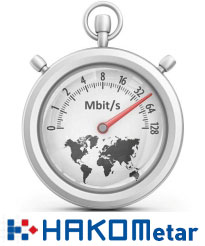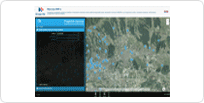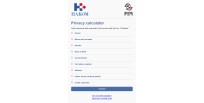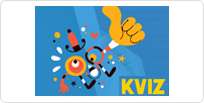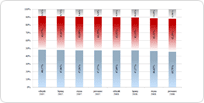Hakom - Croatian Post and Electronic Communications Agency
e-Agency
Users:
Cost Estimator
The Holder of Framework Programme
GIS portal
Privacy calculator
Application ''Quiz''
Market survey
Fewer transported passengers, more carried goods
PRESS RELEASERailway operators transported fewer passengers but more goods in the second quarter. At the same time, providers of postal services provided almost the same amount of services as last year.
ZAGREB, 11 September 2014 – The rail services market recorded a 2 percent fall in the number of transported passengers compared to the previous quarter and a 12 percent fall compared to the same quarter of 2013. On the other hand, there was a 10 percent growth in the transport of goods compared to the first quarter but this was still 3 percent less compared to the same period of last year. At the same time, the number of preformed passenger kilometres increased by around 7 percent, but it was still 5 percent less than in the same period of last year. The number of tonne kilometres performed increased on the quarterly and on the annual level. The quarterly growth amounted to 10, and the annual growth to 2 percent.
A total of 5 million of train-kilometres was performed on the railway infrastructure managed by the biggest provider of rail services HŽ Infrastruktura d.o.o., which is about 4 percent less than in the previous quarter and 14 percent less than in the same period of last year. The infrastructure access service realized a total of slightly more than a billion of gross tonne kilometres, which is slightly less than in the previous quarter and a 6 % drop compared to the same period of last year. The gross tonne-kilometre is the most significant unit of measure for weight, which directly influences the infrastructure and it is also the basic unit of measure for the calculation of the energy consumption of electric tractive vehicles.
The postal services market did not manage to maintain in the second quarter of 2014 a positive trend that existed in the several previous quarters. The amount of provided postal services decreased compared to the previous quarter by slightly more than two percent, while the number of services remained the same as the year before, regardless of the poor economic situation.
The majority of services, around 70 %, were provided by HP-Hrvatska pošta d.d., while the rest was provided by 20 other providers of postal services active on the market.
Indicators of the rail and postal services markets are available at HAKOM’s website at the following link: default.aspx?id=60.A total of 5 million of train-kilometres was performed on the railway infrastructure managed by the biggest provider of rail services HŽ Infrastruktura d.o.o., which is about 4 percent less than in the previous quarter and 14 percent less than in the same period of last year. The infrastructure access service realized a total of slightly more than a billion of gross tonne kilometres, which is slightly less than in the previous quarter and a 6 % drop compared to the same period of last year. The gross tonne-kilometre is the most significant unit of measure for weight, which directly influences the infrastructure and it is also the basic unit of measure for the calculation of the energy consumption of electric tractive vehicles.
The postal services market did not manage to maintain in the second quarter of 2014 a positive trend that existed in the several previous quarters. The amount of provided postal services decreased compared to the previous quarter by slightly more than two percent, while the number of services remained the same as the year before, regardless of the poor economic situation.
The majority of services, around 70 %, were provided by HP-Hrvatska pošta d.d., while the rest was provided by 20 other providers of postal services active on the market.
# # #
For additional information please contact:
Croatian Regulatory Authority for Network Industries (HAKOM)
Roberta Frangeša Mihanovića 9
10110 Zagreb, Croatia
Tel. + 385 (0)1 700 70 07
Fax + 385 (0)1 700 70 70
Media inquiries can be submitted online using HAKOM’s official website: https://www.hakom.hr
Registration required.
ABOUT HAKOM:
HAKOM (www.hakom.hr) - Croatian Regulatory Authority for Network Industries – ensures preconditions for a fair market competition, stable growth and environment for innovations in the electronic communications and postal services market. HAKOM protects users’ interests and the possibility of choice among various communications and postal services at affordable prices, defines sustainable competitive conditions for operators and service providers under fair conditions for return on investment, and provides support to economic growth, public services and the quality of life in the Republic of Croatia by using modern technologies. HAKOM’ strategic goals are: to promote regulation of the electronic communications and postal services market, to support growth of investments and innovations in the electronic communications and postal services market, to provide efficient use of limited resources, to accelerate the growth of broadband products and services, to provide affordable offers of communications and postal services, to provide protection and informing of users, to build an efficient and comprehensive information system, to define and implement efficient processes, and to acquire multi-disciplinary competencies in market regulation.


